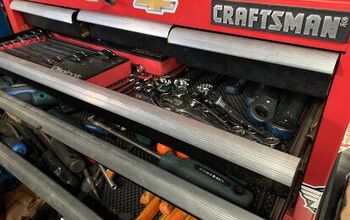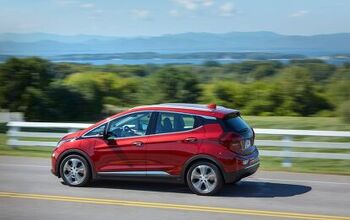Editorial: Obama Lets California Determine National Fuel Economy Standards
California accounts for a huge chunk of America’s new car sales (at least for the transplants). And 13 other states (Arizona, Connecticut, Maine, Maryland, Massachusetts, New Jersey, New Mexico, New York, Oregon, Pennsylvania, Rhode Island, Vermont and Washington) follow its vehicular emissions laws. Put them together and they account for just under half of all American new vehicle sales. And now, thanks to President Obama’s decision to grant California a waiver from federal emissions regulations, they’re going to call the shots for the entire U.S. automotive industry.
President Obama will free California impose its own vehicular tailpipe regulations. Those rules, already drafted, consider CO2 a pollutant. (Global warming and all that.) Manufacturers wishing to sell vehicles in California and its legislative clones will have to meet a new, fleet-wide CO2 standard. As CO2 emissions are directly related to fuel economy, CA et. al. will be, effectively, directing the carmakers to sell higher mileage vehicles. Significantly higher.
“The California law, which was originally meant to take effect in the 2009 model year, requires automakers to cut emissions by nearly a third by 2016, four years ahead of the federal timetable,” The New York Times reports. “The result would be an increase in fuel efficiency in the American car and light truck fleet to roughly 35 miles per gallon from the current average of 27.”
There are two schools of thought on the effects of this move. First, not only can Detroit and the rest of them meet the higher standards, but it’s about fucking time.
“This is a complete reversal of President Bush’s policy of censoring or ignoring global warming science,” Daniel J. Weiss, director of climate strategy at the Center for American Progress in Washington, told the Gray Lady. “With the fuel economy measures and clean energy investments in the recovery package, President Obama has done more in one week to reduce oil dependence and global warming than George Bush did in eight years.”
For environmental activists, the idea that automakers can meet the new California standard is a given. Another shibboleth: carmakers would have already done so if not for their greedy, SUV-pimping, foot-dragging ways. The fact that $4 a gallon gas did more for the environmentalist’s cause than decades of federal corporate average fuel economy (CAFE) standards is shoved aside. As is the fact that the electorate voted with their wallets.
There’s a planet to be saved; free markets be damned. From this perspective, the federal waiver is a victory for Mother Earth that will be fully vindicated by its non-impact on the auto industry and its immeasurable impact on the earth’s climate. One way and the other, decades hence, people will wonder what all the fuss was about.
Alternatively, the decision to empower California to set national fuel economy standards will, as the automakers have warned, wreak havoc on a fragile industry, drive-up prices for consumers and, ultimately, fail.
There’s no way automakers selling cars in America can meet the California mob’s higher, fleet-wide fuel economy standards within the deadline without chopping low-mileage models from their lineup within the relevant states. (The fuel-sucking CUV halfway house, for example, just became an evolutionary dead end.) Detroit News columnist Daniel Howes described the CA mandate as the involuntary hybridization of the nation’s fleet. That sounds about right to me.
Whether manufacturers would offer low[er] mileage vehicles for sale outside of the 14-states is a tricky question, given the intersection of politics, PR and commercial reality. Whether those non-CA-friendly vehicles could be “imported” into the 14-state cabal is even trickier. And speaking of tricky…
As The NYT points out, the new laws mean “automobile manufacturers will quickly have to retool to begin producing and selling cars and trucks that get higher mileage than the national standard, and on a faster phase-in schedule.”
Has anyone looked at the U.S. new car market recently? Who’s got money for that shit? And who’s going to pay cash money to buy these newfangled fuel misers? What if these wonderful machines don’t sell?
All of which highlights the small matter of what “we” (i.e. taxpayers) are going to do about GM and Chrysler, currently (and for the foreseeable future) sucking on Uncle Sam’s teat.
While the Department of Energy is preparing to dole out dole worth $25b for retooling “loans” to build these more left-coast compliant vehicles, this turn of events suggests that Uncle Sam will be on the hook for even more more money for GM and ChryCo. Hey, you want us to build way cool fuel efficient vehicles? You gotta pay. I mean, loan.
I understand the rationale behind California’s zeal and President Obama’s support. But there’s no doubt that they’ve just invoked the law of unintended consequences. Thought politically toxic, a gas tax hike would have been a far more effective solution. As we shall soon see.
More by Robert Farago
Latest Car Reviews
Read moreLatest Product Reviews
Read moreRecent Comments
- 3-On-The-Tree 2014 Ford F150 Ecoboost 3.5L. By 80,000mi I had to have the rear main oil seal replaced twice. Driver side turbo leaking had to have all hoses replaced. Passenger side turbo had to be completely replaced. Engine timing chain front cover leak had to be replaced. Transmission front pump leak had to be removed and replaced. Ford renewed my faith in Extended warranty’s because luckily I had one and used it to the fullest. Sold that truck on caravan and got me a 2021 Tundra Crewmax 4x4. Not a fan of turbos and I will never own a Ford again much less cars with turbos to include newer Toyotas. And I’m a Toyota guy.
- Duke Woolworth Weight 4800# as I recall.
- Kwik_Shift_Pro4X '19 Nissan Frontier @78000 miles has been oil changes ( eng/ diffs/ tranny/ transfer). Still on original brakes and second set of tires.
- ChristianWimmer I have a 2018 Mercedes A250 with almost 80,000 km on the clock and a vintage ‘89 Mercedes 500SL R129 with almost 300,000 km.The A250 has had zero issues but the yearly servicing costs are typically expensive from this brand - as expected. Basic yearly service costs around 400 Euros whereas a more comprehensive servicing with new brake pads, spark plugs plus TÜV etc. is in the 1000+ Euro region.The 500SL servicing costs were expensive when it was serviced at a Benz dealer, but they won’t touch this classic anymore. I have it serviced by a mechanic from another Benz dealership who also owns an R129 300SL-24 and he’ll do basic maintenance on it for a mere 150 Euros. I only drive the 500SL about 2000 km a year so running costs are low although the fuel costs are insane here. The 500SL has had two previous owners with full service history. It’s been a reliable car according to the records. The roof folding mechanism needs so adjusting and oiling from time to time but that’s normal.
- Theflyersfan I wonder how many people recalled these after watching EuroCrash. There's someone one street over that has a similar yellow one of these, and you can tell he loves that car. It was just a tough sell - too expensive, way too heavy, zero passenger space, limited cargo bed, but for a chunk of the population, looked awesome. This was always meant to be a one and done car. Hopefully some are still running 20 years from now so we have a "remember when?" moment with them.


































Comments
Join the conversation